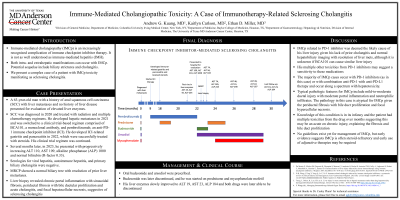Tuesday Poster Session
Category: Biliary/Pancreas
P2917 - Immune-Mediated Cholangiopathic Toxicity: A Case of Immunotherapy-Related Sclerosing Cholangitis
Tuesday, October 24, 2023
10:30 AM - 4:00 PM PT
Location: Exhibit Hall

Has Audio
- AK
Andrew Kuang, MD
Baylor College of Medicine
New York, NY
Presenting Author(s)
Andrew Kuang, MD1, Kaitlyn Carlson, MD1, Hao Chi Zhang, MD2, Lan Wang, MD2, Ethan Miller, MD2
1Baylor College of Medicine, Houston, TX; 2University of Texas MD Anderson Cancer Center, Houston, TX
Introduction: Immune checkpoint inhibitors (ICIs), including inhibitors of programmed cell death protein-1 (PD-1), can cause immune-mediated hepatobiliary toxicity (IMH). IMH can present as a cholangiopathic phenotype, which can involve intrahepatic and/or extrahepatic bile ducts. We present a case of IMH manifesting as sclerosing cholangitis.
Case Description/Methods: A 63-year-old man with a history of anal squamous cell carcinoma with liver metastases and no history of liver disease presented for evaluation of elevated liver enzymes. Cancer was diagnosed in 2020 and treated with radiation and multiple chemotherapy regimens. He developed hepatic metastases in 2021 and was switched to a clinical trial-based regimen comprised of BCA101, a monoclonal antibody, and pembrolizumab, an anti-PD-1 ICI. He developed immune-related gastritis in 8/2022 and pancreatitis in 11/2022, the latter of which was effectively treated with steroids. Subsequently, he had a slow rise in liver enzymes. He continued both cancer drugs and received pembrolizumab in 1/2023. In 2/2023 he presented with ALT 110, AST 109, alkaline phosphatase (ALP) 1000 and normal bilirubin. Serologies for viral hepatitis, autoimmune hepatitis, and primary biliary cholangitis were negative. MRCP showed a normal biliary tree with resolution of liver metastases. Liver biopsy revealed chronic portal inflammation with sinusoidal fibrosis, periductal fibrosis with bile ductular proliferation and acute cholangitis, and focal hepatocellular necrosis, suggestive of sclerosing cholangitis. A clinical diagnosis of ICI-mediated cholangiopathy (IMCp) was made. Ursodiol and budesonide were started. He was later switched to prednisone and mycophenolate mofetil as outpatient, and his liver enzymes slowly improved to ALT 49, AST 65, and ALP 193.
Discussion: IMCp was deemed the likely cause of his liver injury given the lack of prior cholangitis and normal hepatobiliary imaging, though it is unknown if BCA101 can cause similar liver injury. IMCp is a phenotype of IMH that presents with a cholestatic pattern of liver biochemistry. Histopathologic features include bile duct injury with portal inflammation and neutrophilic infiltrates. Bile duct dilatation, stenosis, or wall thickening can be seen on imaging. While the incidence of IMCp is unknown, the majority of reported cases occur with PD-1 inhibitors. No guidelines specific to treating IMCp exist. Evidence suggests IMCp is often steroid-refractory and early use of adjunctive therapies may be needed.
Disclosures:
Andrew Kuang, MD1, Kaitlyn Carlson, MD1, Hao Chi Zhang, MD2, Lan Wang, MD2, Ethan Miller, MD2. P2917 - Immune-Mediated Cholangiopathic Toxicity: A Case of Immunotherapy-Related Sclerosing Cholangitis, ACG 2023 Annual Scientific Meeting Abstracts. Vancouver, BC, Canada: American College of Gastroenterology.
1Baylor College of Medicine, Houston, TX; 2University of Texas MD Anderson Cancer Center, Houston, TX
Introduction: Immune checkpoint inhibitors (ICIs), including inhibitors of programmed cell death protein-1 (PD-1), can cause immune-mediated hepatobiliary toxicity (IMH). IMH can present as a cholangiopathic phenotype, which can involve intrahepatic and/or extrahepatic bile ducts. We present a case of IMH manifesting as sclerosing cholangitis.
Case Description/Methods: A 63-year-old man with a history of anal squamous cell carcinoma with liver metastases and no history of liver disease presented for evaluation of elevated liver enzymes. Cancer was diagnosed in 2020 and treated with radiation and multiple chemotherapy regimens. He developed hepatic metastases in 2021 and was switched to a clinical trial-based regimen comprised of BCA101, a monoclonal antibody, and pembrolizumab, an anti-PD-1 ICI. He developed immune-related gastritis in 8/2022 and pancreatitis in 11/2022, the latter of which was effectively treated with steroids. Subsequently, he had a slow rise in liver enzymes. He continued both cancer drugs and received pembrolizumab in 1/2023. In 2/2023 he presented with ALT 110, AST 109, alkaline phosphatase (ALP) 1000 and normal bilirubin. Serologies for viral hepatitis, autoimmune hepatitis, and primary biliary cholangitis were negative. MRCP showed a normal biliary tree with resolution of liver metastases. Liver biopsy revealed chronic portal inflammation with sinusoidal fibrosis, periductal fibrosis with bile ductular proliferation and acute cholangitis, and focal hepatocellular necrosis, suggestive of sclerosing cholangitis. A clinical diagnosis of ICI-mediated cholangiopathy (IMCp) was made. Ursodiol and budesonide were started. He was later switched to prednisone and mycophenolate mofetil as outpatient, and his liver enzymes slowly improved to ALT 49, AST 65, and ALP 193.
Discussion: IMCp was deemed the likely cause of his liver injury given the lack of prior cholangitis and normal hepatobiliary imaging, though it is unknown if BCA101 can cause similar liver injury. IMCp is a phenotype of IMH that presents with a cholestatic pattern of liver biochemistry. Histopathologic features include bile duct injury with portal inflammation and neutrophilic infiltrates. Bile duct dilatation, stenosis, or wall thickening can be seen on imaging. While the incidence of IMCp is unknown, the majority of reported cases occur with PD-1 inhibitors. No guidelines specific to treating IMCp exist. Evidence suggests IMCp is often steroid-refractory and early use of adjunctive therapies may be needed.
Disclosures:
Andrew Kuang indicated no relevant financial relationships.
Kaitlyn Carlson indicated no relevant financial relationships.
Hao Chi Zhang indicated no relevant financial relationships.
Lan Wang indicated no relevant financial relationships.
Ethan Miller indicated no relevant financial relationships.
Andrew Kuang, MD1, Kaitlyn Carlson, MD1, Hao Chi Zhang, MD2, Lan Wang, MD2, Ethan Miller, MD2. P2917 - Immune-Mediated Cholangiopathic Toxicity: A Case of Immunotherapy-Related Sclerosing Cholangitis, ACG 2023 Annual Scientific Meeting Abstracts. Vancouver, BC, Canada: American College of Gastroenterology.
